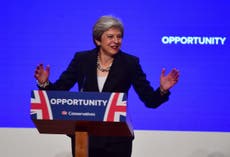Beware the economic consequences of Boris Johnson’s election win
Analysis: A Conservative majority equals Brexit – and substantial repercussions for the nation’s finances

To borrow a Keynesian phrase, soon we will all discover the economic consequences of Boris Johnson. Now with a majority and a mandate to carry out the (opaque) terms of the Conservative manifesto, what will the next five years and more have in store for our economy and our standard of living?
Sajid Javid boldly stated a few weeks ago that the benefits of Brexit were “self-evident”. If so, they are also unquantified.
The first thing to say is that we don’t really know. Not helpful, I suppose, but there are so many known unknowns, as Donald Rumsfeld might say. For example, we do not know what the terms of the new free trade deal with the European Union will be – and no deal remains “on the table” for the end of 2020.
We do not know the contents of any free trade deals with the US, Japan, China, India, Australia, Canada, South Korea or any other major economic powers. We do not know what the comprehensive spending review, much postponed, will mean for public finances, taxes and public spending. We do not know where the pound will go, and thus how inflation might move; what the end of free movement of labour with the EU and whatever happens to migration more widely will do to the labour market, ie employment and wages (because, again, all we can assume is there will be a “points-based system”, which means nothing); and nor do we have much idea of exactly how the wider global economy will develop.
Then there are unknown shocks such as a banking crisis, stock market crash, an oil price spike or some “black swan” event.
Still, we can be reasonably sure of a few things. For a country that relies on external trade for about a third of its living, and where around half of that trade is with the EU, we do know that any kind of Brexit will restrict trade compared with full EU membership, and thus exports, and, therefore, be bad for the economy, which means wages, public services and living standards.
According to the recent leak of Michel Barnier’s frank assessment, the EU will find it virtually impossible to conclude a comprehensive trade deal with the UK by the deadline of 31 December 2020, and British ministers have been careful not to rule out the no-deal option. In the worst-case scenario, modelled by the treasury before Johnson’s time in No 10, a no-deal Brexit would cost the UK some 7.6 per cent of GDP on a cumulative basis over the long run, and it could be more.
To translate that into comprehensible personal terms, just think what a 10 per cent cut in your take-home pay would mean, and a 10 per cent cut in the quality of public services.
In the short term, we could be looking at a substantial increase in unemployment (though from a very low level now), depressed wages and lower investment. Much of the “pent-up” investment supposedly waiting to “unleash Britain’s potential” would be cancelled. Key sectors that rely on EU markets and European Union supply chains would suffer most grievously – cars, aerospace, pharmaceuticals, agriculture, and the City and financial services.
Geographically, places such as the northeast and west midlands that depend on manufacturing (and in which many districts voted Leave) would be hardest hit. Northern Ireland (which voted Remain) may find it derives some advantages from its anomalous position of staying in aspects of the EU customs union or single market.
Overall, the continuing contraction in business investment is especially problematic, because it implies slower productivity growth for the future, which in turn means lower economic growth, wages and the funds to pay for (expensive) improvement in public services such as social care.
Against that, of course, is the prospective positive impact of new trade deals – but these are put at very modest levels by most economists, simply because the volume of British trade with most of the nations is, for the moment, also comparatively modest.
The UK could, for example, abolish all restrictions – tariffs, quotas, most standards – on food imports, which would deliver a saving to consumers, especially poorer families. But would the effect on British farming be acceptable?
Again, much would depend on the terms of the deals, but in the nature of things, the beneficial effects would not be instantaneous, whereas a sudden, indeed chaotic, withdrawal from the EU single market and customs union, particularly under no deal, would be precisely that.
The usual adjustment mechanism for an open economy in such a situation is via the exchange rate – the value of the pound against other currencies. Remember, too, that the UK is even now running a large trade deficit at about 6 per cent of GDP. Another sharp depreciation of sterling seems inevitable, to make UK exports more competitive. However, that will mean higher prices for imported goods and, possibly, higher wage claims (and higher minimum wages) and the sparking of an inflationary spiral – how the Bank of England reacts to these trends will be crucial. If they decide to ramp up interest rates to choke off inflation that will, in turn, hit the housing market, property values, investment and consumer spending.
Thus, a protracted and painful recession is a real possibility under any Brexit scenario.
In a situation where the economy is stagnant or shrinking there will be little money available either for ambitious public services or tax cuts. Infrastructure spending could be protected, but inevitably spending on day-to-day items of public spending would be badly restrained – for example, teachers’ pay. Funds for universal credit might have to be further restricted, as the Conservative manifesto states, to “the most vulnerable”, while areas such as international aid, education, local council services and even the NHS will feel the pinch.
The few winners under such a set of circumstances would include those individuals and companies who derive much of their income or own assets denominated in foreign currencies, and those who are most able to reform their operations to make them globally competitive in a hostile trading environment – trade wars between the US, China and virtually everyone else are going on right now.
The economic consequences of Boris Johnson, then, will be unpleasant for the vast majority of British people. It’s just a question of degree. It’s as predictable as that.





Join our commenting forum
Join thought-provoking conversations, follow other Independent readers and see their replies